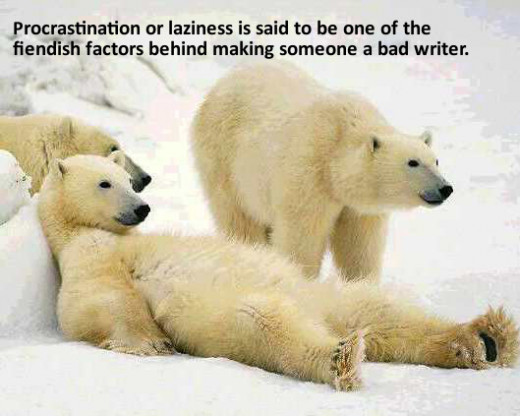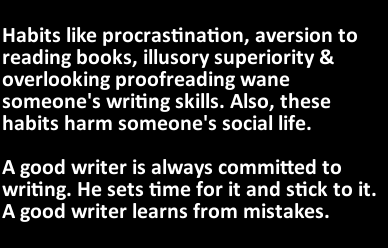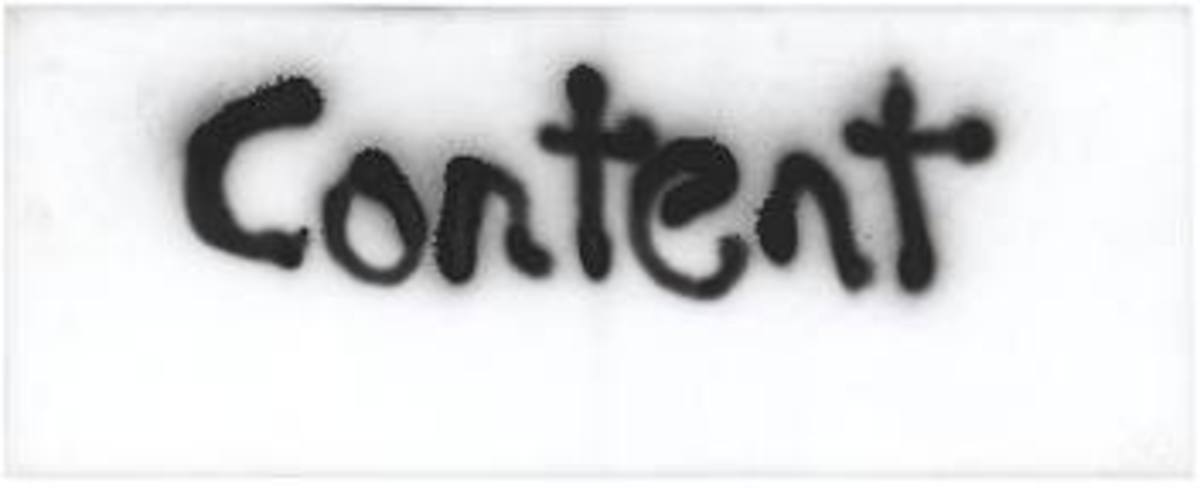Content Writing: 4 Habits Signifying Your Weaknesses As A Writer
What Makes Someone A Bad Writer?

Prologue
Content writing is a commitment of everyday practice. It’s not something that should be taken as someone’s leisurely pastime activity.
Seeing that people develop many habits (wittingly or unwittingly) throughout their life, content writing, in this aspect, is being produced as a topic of subjective analysis of those habits that a writer develops, and which wane one’s writing productivity in due course of time.
This article talks about 4 habits symbolizing a writer’s characteristic flaws.
However, description of each habit bears my subjective analysis. Therefore, it may or may not accord to discretion of many readers.
To be precise, I've left no stone unturned to make it educative, informative and worth-reading stuff.
THE 4 Habits Signifying Weaknesses of A Writer:
1. Procrastination
To say the least, procrastination is a habit of keeping up with yesterday. People with “I’ll do it later” mindset are the procrastinators (who are) oblivious to the damage being inflicted upon them like a caffeinated coffee that acts like a slow poison to the organic functionaries of a body.
What if We Procrastinate?
As discussed, writing is a commitment of everyday practice. Procrastination simply denotes your unwillingness to continue with the practical approach of writing things every day.
The psychology of procrastination says we are either obsessed with our illusory superiority {something like “Writing? Now? Oh! Common! I can do it anytime, but not now.” If you can guess something otherwise, you are geniusJ}
OR,
WE WRONGLY assume the reluctance of our STATE of mind (something like “I don’t think I can work on this project now. Maybe later”).
Sign of Procrastinators


What Happens, then?
A book, “Still Procrastinating: The No Regret Guide to Getting It Done” by Joseph Ferrari, a professor of psychology at DePaul University in Chicago, says procrastinators have strange paranoia about a particular course of action – that, if taken, will negatively affect their future. The book talks about different types of procrastinators.
For example, an indecisive procrastinator keeps delaying a task until he is determined. He may want to dine out at a hotel, but can’t make up their mind about the timing and selection of a good hotel.
They just resign themselves to an endless pensiveness.
Such procrastinators, as it appears, lack good decision-making skills.
Now, procrastination lays the base for stress overload and mental illness aside from jeopardizing sufferer’s social relationship. For instance, such procrastinators don’t turn up in someone’s need or they simply avoid any social contact with outside world.
No improvement in writing manifests in those who annoyingly procrastinate writing. Moreover, the sufferers blow several chances which come under the garb of career-advancing opportunities, just because they didn’t show up when needed.
Procrastinators strongly cling to their comfort zone. They eventually grow up with apathy for writing.
They exude a sign of impassiveness for writing.
2. You Do Not Read A Lot
That’s another “bad habit” that most writers or people have or at least not aware of the impending risk that they invite because of it.
Reading is as much important as writing. To a certain extent, it is more important to read first than start to pen articles. Why, we can’t ignore reading as it is one of the best “thought-developing” ways.
A mind devoid of ample constructive thoughts can’t write contents constructive enough. Reading and writing, as I can understand, are reciprocal.
The Benefits of Reading Books
- Helps you do mental exercise, thus improving cognitive intelligence in due course of time
- Great stress buster and helps you disengage from stressful environment
- Improves your knowledge significantly – the more you read, the more you learn
- You learn new words every time when you read, thus it paves the path for vocabulary improvement
- Some things remain foreign to reality until we read about them. Hence, reading brings forth awareness
- Reading helps you analyze things deeply. It improves the way you see (observe) things
Reading is one of the best remedial solutions to poor writing (you learn different styles of writing gradually)
Benefits of Reading Books


How does Superiority Complex Affect Us?
- It directly strikes hard on your ego, thus turning many of your friends against you
- It isolates you from the place where respect and sensitive are required
- Your Freudian slip (usually driven by superiority complex) may hurt your admirers (if you have any)
- There is no career growth for such people. All they know is how to bully others
- Superiority complex is actually the root cause of inferiority complex. People have this to shield their inferiority or shortcomings
People grow up with deluded supremacy, paranoia and maniac depression eventually. They harm them later in the form of destructive living style.
Therefore, superiority complex affects us in many ways. Aside from harming you as a writer, it destroys your personal life as well.
The solution is, do not try to judge others with what you have.
Everyone is genius and so are you. Just enjoy writing, and if need be, help others effusively.
3. Self-professed Superiority Complex
There are some people who mistakenly rate their ability much higher than they actually are.
You may have come across many people who are opinionated and who believe that their knowledge, their understanding and their skills are much better than others.
Call it overconfidence or illusory superiority; these people flaunt their self-professed superiority complex (symbolic of characteristic badness). This habit is bad in the sense that people suffering from illusory superiority turn out to be those who are arrogantly opinionated, biased and share their prejudice with haughtiness.
4. Overlooking Proofreading
How would you judge a parcel wrapped up beautifully with colorful ribbons?
You will feel glad to have it, aren’t you?
Well, what if the thing inside the beautiful pack turns out to be a nasty trick-work of someone?
Say for instance, you get yourself hurt on nose by the boxing spring that instantly popped out of the parceled box.
Whatever you feel at that time is the very feeling you have when you see a beautifully titled article with badly proofread contents inside.
You get turned off.
Or possibly, try to be helpful by offering some pieces of advice (which usually fall on deaf ears).
The essence is, those who ignore proofreading are not doing anything helpful to improve their writing skill.
Proofreading and Misconception of Grammar
Everything must be grammatically accurate – Wrong, because grammar changes and so does the syntax.
A grammar rule from an erstwhile era is either obsolete or no longer in sight in books or writing (please, correct me if you think otherwise).
People advise grammatical improvements or anything related to writing according to their own understanding/acquired knowledge and perception. Hence, it may or may not accord to your discretion.
Why?
Because what knowledge or understanding you’ve acquired through your writing experience may conflict with the advice offered by others.
They are mutually discordant.
As said before, grammar evolves through times. A writer must necessarily keep in touch with the changing rules of grammar lest he/she should sound conventional.
Proofreading doesn’t necessarily mean to have your contents 100% grammatically perfect as the demand of such perfection is the very antithesis of advocated credo of learned persons such as the one by Henry Fielding’s
“None are more ignorant than those learned Pedants, whose Lives have been entirely consumed in Colleges, and among Books."
The difference between “To who it may concern” and “To whom it may concern” may frown many grammarians (if the latter is denied), however, the fact is, WHOM is dying out. However, in writing, both are true.
The point is, if the representation of an idea seems vogue just because you have to add certain grammar rules, avoid them.
Only the learned pedantic go for grammar, the information hungry people see the uniqueness of your contents.
So, is Grammar Useless?
No!
NEVER!
Grammatically unimproved contents are annoying. If you want to win the trust of your readers, you have to be perfect at it, but certainly you’re not supposed to be obsessed with it.
Bad Writing Habits

Habits Signifying Your Weakness As A Writer: At a Glance
- Procrastination: Never delay writing. If you have set a time for it, stick to it anyway.
- Read a Lot: Never ignore reading books for it helps you have good command on words and writing styles
- Superiority Complex: Pride always goes before a fall. Do not show off.
- Overlooking Proofreading: Very essential for every writer, new or experienced.
Poll Questions
What Makes Someone A Bad Writer?
At Last,
One’s habits determine one’s extent of success. Good habits deliver good results, bad habits don’t.
The catch is, your habits define the gravity of awesomeness or awfulness of your content writing.
Most importantly, they do define you as a good/bad content writer.








